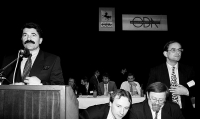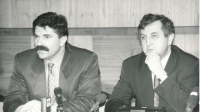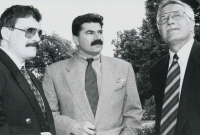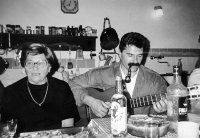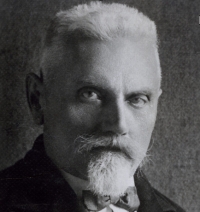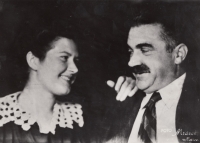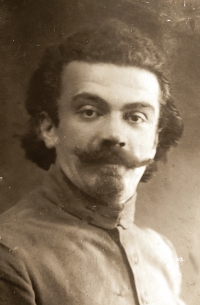“In 1982, I met, in one of my lives... as the first one took place in Rokycany and the second one in Prague, where I would come back often, almost every evening. In one of those worlds I met historian Karel Bartošek, who had already spent some time in prison in the 1970s, and who was among people targeted in the Operation Asanace (Clearance), as we would learn later, back then, I didn't know the name, and that's what had happened to him: he had been employed at a company doing drilling at the Berounka river, and once a week, he came to Prague for a holiday. And he would usually end up in the U Kocoura/Cat's Inn in Malá Strana part of Prague, where he would enjoy himself in a group of other respectable gentlemen, Mr. Pecka, for example – the well-known, prominent prisoner of the Stalinist regime. And it all had happened on this Thursday, when after a few beers he had been going from Malostranské Square to Smíchov, where we both had been living at that time. At that moment, two young people got in the car, they were sitting in the back, and the driver went straight down the Nadražní street towards the house where Bartošek had been living, yet he stopped in front of a police station, where they had been expecting him already. They arrested Bartošek, and then they would put him into custody. And he had been accused of this offence, they claimed that he had damaged a member state of the global socialist community, by speaking with those young people who were sitting in the back, who were acting as lovers, yet both the boy and the girl had the rank of warrant officer, so he had this subversive conversation with them regarding the martial law in Poland, that had been declared at that time. Bartošek had been released the next day, but I might be wrong on that. His family had contacted me and I would meet him. And as he had been charged with this crime, I started acting as his defence lawyer. And that had been an interesting case indeed. As it seemed that the State Security didn't know me. But Bartošek, he was this prominent dissident, his wife was French. And he had connections both with this community of French historians and the Communist party of France. And it seemed more like they were pretending that there was a court case. As the delays had been so long, nothing had been happening for such a long time. Today, we could see what this Operation Asanace was, why would they harass him like this, and why they were in no hurry. Meanwhile, there were events which had been described in detail; for example, at Smíchov, they had been living on a fourth floor. So after he had been released, while he was at work with his drilling crew, someone would ring on the door and his family had to face this group of undertakers with a coffin, stating: 'Where's the body? They told us there was this Bartošek...' Those were the means they utilised during the Operation Asanace. He was maybe one of the two or three people they tried to scare this way. The other one was Jan Urban. And of course, they would pressure Bartošek quite hard, his daughter, if I am not mistaken, had been charged with parasitism, as she hadn't been admitted to a secondary school and had been doing a language course. So they gave him this special treatment I would say, according to the logic of that time. And I had this friend who had been serving as a public prosecutor, he was a Party member, and I asked him to look into this funeral parlour thing which had been arranged before this accident. And he tried to investigate the case in all honesty, but he found out that it had been ordered by entities related to the Ministry of the Interior, and then he told me he had to stop doing that. As he had some explaining to do. I am telling you this because this communist public prosecutor had been quite outraged by what was happening, and he indeed wanted to investigate the case. I told him to let it be, in his own interest, but the thing is there were people like this. And this prosecution ended after Karel Bartošek decided he would leave the country, and they were quite excited about that. And before he had left, there was this party at his flat in Smíchov, I was there, and I had to pass this line of State Security cameras, but the party was just alright – not the right thing to say – as we all gathered on the occasion of Karel Bartošek leaving the country for good. And after a few weeks, when he had already left with his family, I had been summoned to trial as his defence lawyer, where Karel Bartošek was supposed to be sentenced. So I went there, the public prosecutor was also there, and the Chairman of the Court said: 'Where's your client, Mr. Counsel?' And I said, quite surprised: 'Maybe Mr. Prosecutor could know something about that, right?' - 'What do you mean?' And I said: 'Well, as far as I know, my client left the country legally. And I am surprised that Mr. Prosecutor...' Well, it was quite uncomfortable in the end, as they would make a complaint about my conduct, but that wasn't important. The conclusion, that's important. The trial hadn't been concluded, it went on like my client was a fugitive, and he had been given a suspended sentence. A suspended sentence, Bartošek had been sentenced, so there was just this single point to this whole show, to sentence Bartošek, in case he would like to come back someday or something like that. But they had to try him as a fugitive. But there wasn't any ground for that, as a fugitive is an individual whose whereabouts are unknown, not an individual who was given a passport by the state so he could leave the country. But things like this had happened, so I would say that it should be recorded.”
